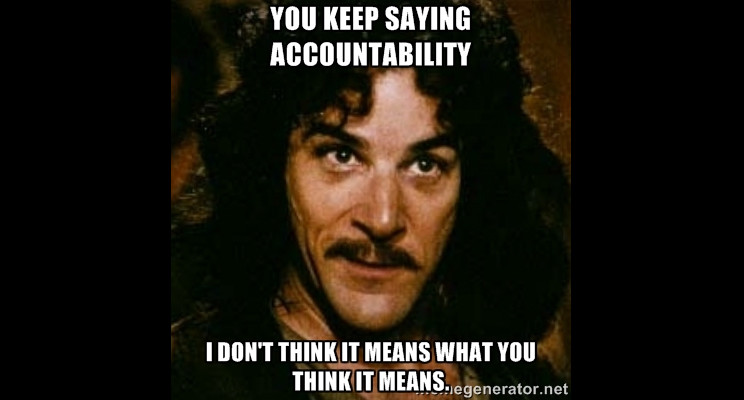What this article will discuss:
The concept of accountability, and what it actually means in a practical environment.
Why you should read it:
Follow these 5 rules and your team will work harder, stay loyal longer, and be more successful.

It is impossible to build a team without clearly defined roles and expectations. It is equally important to be clear when those expectations are not met. In an office environment, this can be difficult. It's easy to let something slide when it's "close enough" to what you need, or make the required tweaks yourself. But this is doing your colleague a disservice. How can you expect your colleague to do better next time if they aren't aware what was wrong?
Modern society has a phobia of failure, we live in a world of participation trophies, and games with no score. We don't want to make our colleagues feel bad by telling them what they've done wrong.
Yet, flick through your companies ‘values’ and you’ll probably find 'Accountability'. There’s lots of talk about the importance of accountability, but it’s rarely practiced. Like most buzzwords, it exists as an abstract concept. There is a fundamental misunderstanding of what that concept is. A misunderstanding not helped by the vague definitions floating around.

I define accountability as “holding yourself, or others responsible for their actions, whether those actions are GOOD OR BAD”. It's setting clear expectations, communicating those expectations, and then comparing performance with expectation. Emphasizing accountability is not intended to demoralise others, pass blame, or create fear of making a mistake. Positive accountability is one of the most powerful tools in your leadership toolkit.
Studies have shown that athletes make more money, than similarly qualified non-athletes. I believe this all starts with accountability that is part and parcel of high level sport. There's something about the adrenaline-charged atmosphere that amplifies every crack in team chemistry. I find it both fascinating and frustrating what can happen when that atmosphere doesn't exist, such as in an office. In work it's easier to sweep everything under the carpet.

Sure, constantly letting your colleagues know that their work isn't meeting your expectations is a sure-fire way to kill morale. But follow these 5 rules and it doesn't need to be that way.
1. Hold yourself accountable: This may seem obvious, but is often difficult. As a leader, you cannot hold anyone else accountable to standards that you can't meet yourself. Accept responsibility and own your mistakes. You will soon find those around you doing the same.
2. Make it fair: Always hold everyone accountable, all the time. You can not pick and chose when to evoke accountability. Accountability is an all or nothing endeavour. If you let anything slide, it can, and probably will be construed as unfair, because it is. Holding others accountable requires you to hold everyone to the same standard.
3. Be positive: Accountability is a two-way street, you should be as forthcoming with praise as you are with criticism. A desire for positive feedback is a more powerful motivator than fear of failure. Every time your expectations are met, or exceeded make a point of communicating that.
4. Take responsibility for your team: Treat any mistake made by your team as a personal mistake by you. The point of holding individuals accountable is to avoid mistakes in the first place. Accountability for team performance rests on the shoulders of the leader.
5. Be an accountability 'valve': A good team needs a leader who will take the blame when things go wrong, but deflect praise when it goes well. When someone in your team makes a mistake they should be accountable to you, nobody else. Nobody outside your team needs to know whose mistake it was. When your team is successful, make sure others are aware who is responsible.
Follow these 5 rules and your team will work harder, stay loyal longer, and be more successful.



Comments